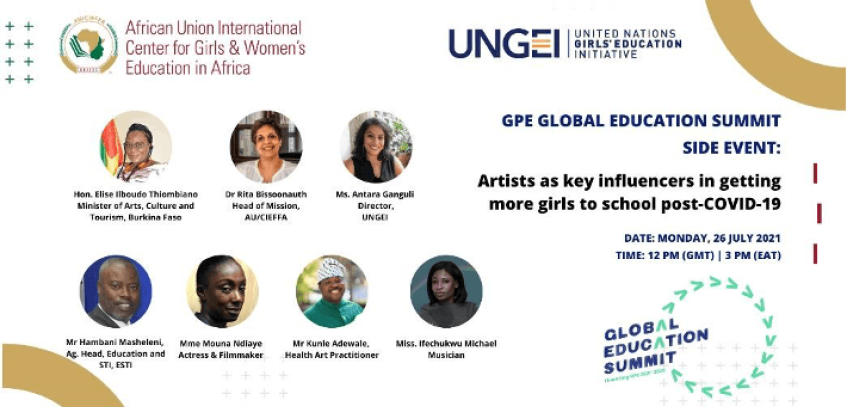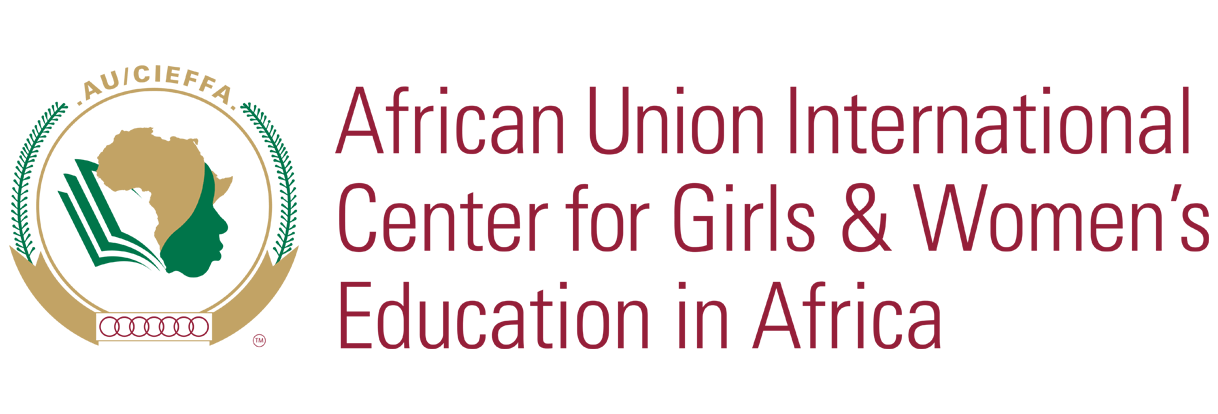Ouagadougou, 26 July 2021 – The African Union International Centre for Girls and Women’s Education in Africa (AU/CIEFFA) and the United Nations Girls Education Initiative (UNGEI) have partnered to host a joint side event at the margins of the Global Partnership for Education’s (GPE) 2021 Global Education Summit highlighting the role of African artists as key influencers in the fight to get girls back to school post-COVID-19.
Key speakers at the event included Hon. Elise Ilboudo Thiombiano, Minister of Arts, Culture and Tourism, Burkina Faso and Ms Antara Ganguli, Director, UNGEI, and was moderated by Dr Rita Bissoonauth, Head, AU/CIEFFA. The event was divided into a panel discussion moderated by AU/CIEFFA’s Senior Policy Officer, Mrs Simone Yankey-Ouattara and a 15-minute music and poetry session by young artists from Africa.
In her opening remarks, Dr Rita Bissoonauth, pointed out that African girls and women are facing the brunt of the COVID-19 pandemic as they bear the burden of care work and are more vulnerable to gender-based violence. She went on to highlight the link between arts, culture and education, which are not always easily perceived but these fields are interlinked.
She added that “Embedding arts, culture and heritage actors within education enables us to preserve, restore and rehabilitate strong values as well as create an unparalleled enabling environment and framework for the promotion and protection of girls and women’s basic human rights through education”.
In her keynote address, Hon. Thiombiano commended the collaboration between AU/CIEFFA and UNGEI that seeks to bring to the table and engage art, culture and heritage actors as key influencers in the African society in the fight to promote girls’ and women’s education.
The Minister in her address alluded that for Africa to achieve its goal of educating women and girls, all stakeholders, including artists and cultural gatekeepers, must be engaged to find to find strategies and solutions that promote the agenda of educating more girls and women.
“Culture appears as the base on which we must promote the education of our girls. We have a diversity of cultural activities that can promote girl’s education. Thus, songs, music, fine arts and performing arts, can raise a collective awareness in favor of girl’s education,” she said.
The panel session included Kunle Adewale, an Arts teacher and founder of the Arts in Medicine Fellowship Program from Nigeria, Ms Mouna Ndiaye, an actress from Burkina Faso, Ms
Ifechukwu “Ife” Michael, a musician from Nigeria and Mr Hambani Masheleni, Ag. Head, Education and STI, African Union Commission Education, Science, Technology and Innovation (AUC/ESTI) department who discussed on "the Role of culture and arts to combat genderbased stereotypes and social norms to increase the completion rate of girls in Africa.
Mr Hambani Masheleni shared how the department of ESTI is supporting AU Member States to reimagine education, particularly girls’ education, and skills development through Science, Technology, Engineering, Arts and Mathematics (STEAM) for African youth in the COVID-19 context.
Other panellists offered strategies on ways that the continent can embed art and culture subjects in learning in order to facilitate comprehension of mathematics and science in general for learners and girls in particular, and how fields like music and cinematography can be used as advocacy tools. The panellists also highlighted the need to change the stereotypes portrayed in music and film with the African society that perpetuate the objectification of girls.
The panel discussion was followed by a music and poetry session with performances from Afrie, musician, Uganda featuring Ife, musician, Nigeria and Smarty, RAP Artist, Burkina Faso who performed the AU/CIEFFA #AfricaEducatesHer campaign theme song ‘I am an African girl (Let her know)’, TaAfrika, a youth band from Kenya and Tanzania, poetry from Blessing Anaso, Ghana and Maxime Tala from Niger.
In closing the event Ms Antara Ganguli, Director, UNGEI, emphasized that education is the single most important channel to achieve gender equality and urged all education stakeholders to make schools safe and nurturing spaces where children learn to question harmful norms if we are to build more just, non-violent and peaceful citizens.
“This session has taught me that this change we are seeking change cannot happen in boardrooms in New York London or Geneva…This change has to happen with the fire of advocacy on local streets…And if this change can happen with the support, input and beauty of art then it will be a much better and much easier change,” noted Ms Ganguli.
The Global Education Summit: Financing GPE 2021-2025 organized by the GPE is scheduled for the 28th and 29th of July 2021 is a key moment for the global community to come together and support quality education for all children.
Click link to access the recorded event: https://www.youtube.com/watch?v=iPldTZhsLtM
African Union International Centre for Girls’ and Women’s Education in Africa
AU/CIEFFA is a specialized institution of the African Union under the Department of Human Resources, Science and Technology.
The Centre aims to promote girls’ and women’s education with a view towards their full participation in the eradication of poverty and the edification of a peaceful world for sustainable human development. http://www.cieffa.org
United Nations Girls Education Initiative
UNGEI is a global partnership united by a shared commitment to advancing gender equality in and through education. UNGEI provides a platform for coordinated advocacy and collective action in order to break down barriers to education, close the gender gap and unlock its transformative power for all girls, everywhere.










